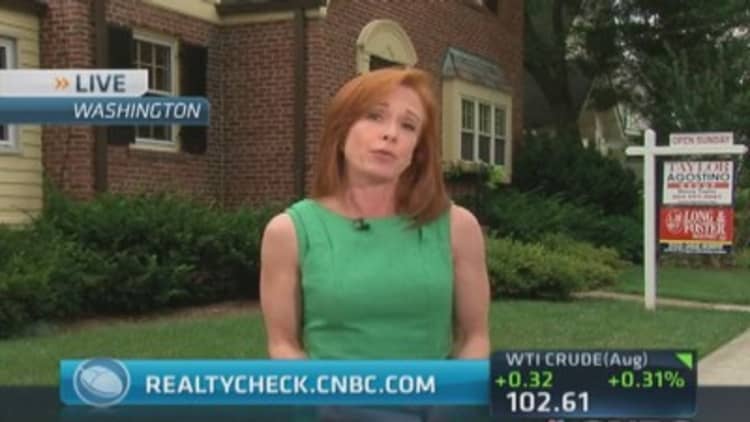Foreclosure activity has been falling steadily for the past few years as the housing market recovers, but the latest reading shows it has hit a new milestone.
According to RealtyTrac, a foreclosure sales and analytics company, 107,194 U.S. properties had a foreclosure filing in June—the lowest level since July 2006, before the housing price bubble burst.
"Over the next six to nine months, nationwide, foreclosure numbers should start to flat line at consistently historically normal levels," said RealtyTrac's Daren Blomquist in a release.
Improvement, however, does not mean the level of distressed housing is back to normal; not by a long shot. There continues to be a wide discrepancy between states that require a judge in the foreclosure process and those that do not.
Read MoreHome builders buoyed by better jobs
Nine states saw foreclosure activity rise in the first half of 2014 compared with a year ago, according to RealtyTrac. They include judicial states such as New Jersey (up 54 percent), Maryland (up 18 percent), Massachusetts (up 4 percent) and Connecticut (up 4 percent). Florida, also a judicial foreclosure state, had the highest rate, with one in 74 housing units receiving some kind of foreclosure filing.
"There continue to be concerning trends in some states and local markets that clearly indicate those markets are not completely out of the woods when it comes to the lingering foreclosure problem left over from the housing bust," Blomquist said.
On the other hand, "Foreclosures are no longer a widespread contagion threatening to derail the housing market's return to full health," he said.
Read MoreMortgage volume tanks, Dimon bashes FHA
There are still between 1.5 million and 2 million seriously delinquent loans, most of which were issued before 2009 and will end up in foreclosure. Rather than all of these properties going back to the banks, however, many could now be sold at foreclosure auctions.
"During the peak of the crisis, there were almost no foreclosure sales at these auctions—lenders repossessed almost all of these distressed properties," said Rick Sharga of Auction.com, a real estate auction site.
"But we've seen an increase in foreclosure sales over the past year, beginning in the nonjudicial states, and now moving into some of the judicial foreclosure states as well. Rising home prices help lenders reduce losses on these sales, and selling at the auction also removes the effort and expense of doing evictions and repairing and maintaining the property after the foreclosure."
While a positive for the overall health of the housing market, the lack of foreclosures coming up for sale is wreaking havoc with pricing and demand in some local markets. Cities that saw the worst of the crisis—and were then swarmed by investors—are now grappling with the exit of those same investors, who left regular potential buyers with higher home prices and severe inventory shortages. Home sales in markets such as Phoenix and Las Vegas are falling as prices continue to rise.
In Southern California, which saw some of the first foreclosures from the housing bust, homes sold at the slowest pace for a June in three years, according to DataQuick, a California-based real estate information service.
Investor purchases in Southern California fell to their lowest level since the end of 2010, and other would-be buyers continued to struggle with inventory and affordability constraints, according to the Dataquick report. Meanwhile, the median sale price rose to its highest level in 77 months, albeit posting the smallest annual gain in two years.

"In many markets price appreciation has slipped into the more sustainable single-digit range, compared with gains exceeding 20 percent this time last year. Why the drop-off? The supply of homes for sale, while still low in an historical context, is higher this year, and the decline in affordability serves as gravity for home prices. People can't stretch with exotic and risky loans the way they could during the last housing boom," said DataQuick analyst Andrew LePage.
Read MoreBuying a house remains out of reach for many
It has all created an interesting scenario. The result of the foreclosure crisis was a complete overhaul of the rules governing lending. That improved mortgage quality dramatically and all but negated delinquencies on the latest loans.
"There's virtually nothing new entering the pipeline—loans issued over the past few years are performing at the highest rates in history," Sharga said.
Now, as investors move out and leftover foreclosures from the housing crash dry up, mortgage-dependent buyers have a new hurdle.
"None but the best-qualified borrowers can get a loan," Sharga said.
—By CNBC's Diana Olick


